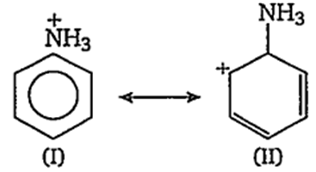 Multiple Choice Questions
Multiple Choice QuestionsAmongst the following the compound that can most readily get sulphonated is
benzene
toluene
nitrobenzene
chlorobenzene
Inductive effect involves:
displacement of σ-electrons
delocalisation of π-electrons
delocalisation of σ-electrons
displacement of π-electrons
Presence of halogen in organic compounds can be detected using
Leibig's test
Duma's test
Kjeldahl test
Beilstien's test
Which of the following species does not exert a resonance effect?
C6H5NH2
C6H5OH
C6H5Cl
B.
Among the given species does not exert a resonance effect.

Structure II is not possible because in it nitrogen contains 10 valence electrons.
